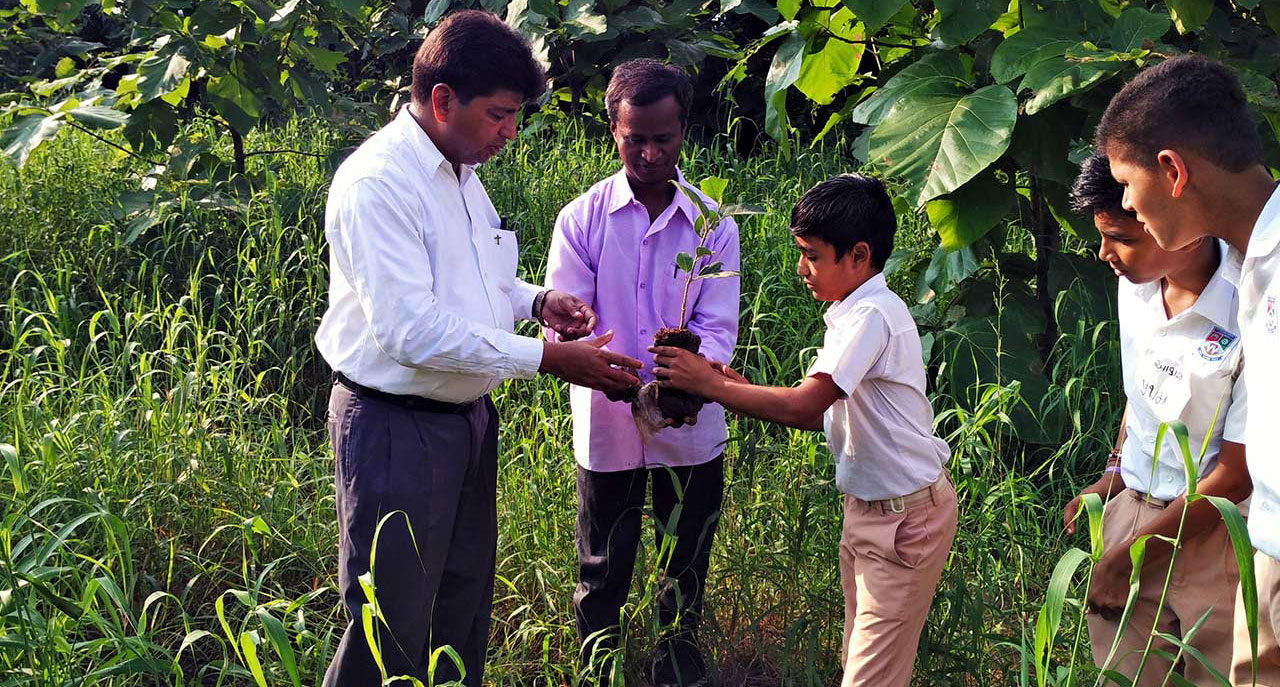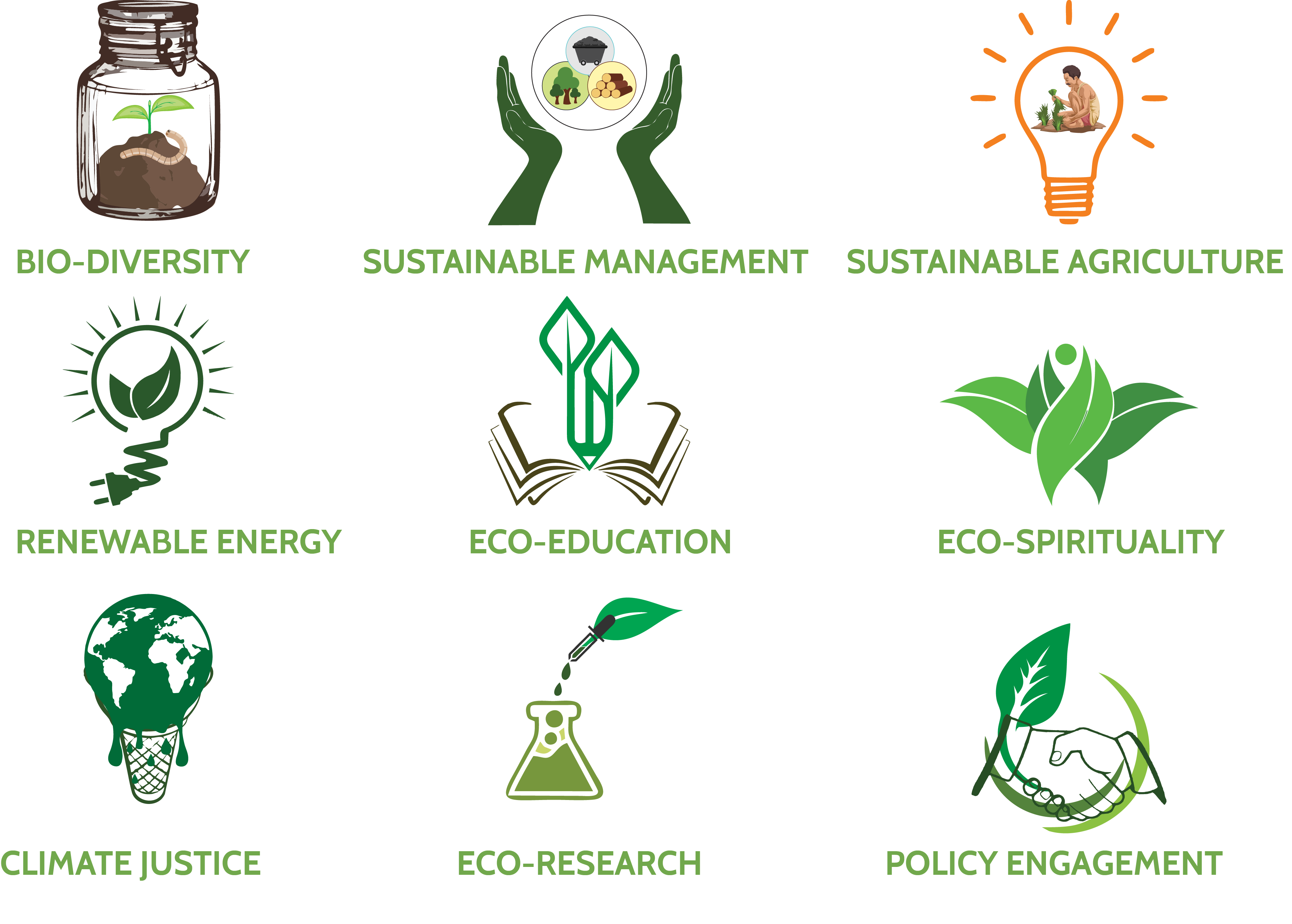

ECO-JESUITS
“Responding to call of the mother Earth”
The planet is under extreme duress with very little left for future generations if immediate amends are not made. There is steady increase in depletion of energy resources, frequency of natural disasters, pestilence and diseases, food security risks, hazardous wastes and water scarcity among others. The need for immediate action resonates with iteration of the United Nations Sustainable Development Goals (SDGs) especially around zero hunger (SDG 2), clean water and sanitation (SDG 6), affordable and clean energy (SDG 7), sustainable cities and communities (SDG 11), responsible production and consumption (SDG 12), climate action (SDG 13), life below land (SDG 14) and life on land (SDG15). Additionally, UN Environment launched the ‘Faith for Earth’ Initiative in November 2017 which highlighted the relevance of faith-based organisations as sustainable institutions and partners to consult on dealing with conservation and management of natural resources. This complex link between the present ecological crisis and emphasis on an urgent paradigm shift has also been reflected in Pope Francis’s Encyclical ‘Laudato Si’. Responding to the need of a strong and consistent initiative towards healing the planet, individual Jesuits and Provinces in South Asia have joined hands to form the Jesuit Ecological Network (Ecojesuits) towards realisation of this eco-mission.
VISION
‘Our Mother Earth, Our Common Home’
MISSION
‘Promoting collective responsibility to care, nurture and sustain the Earth, especially those at the margins, manifested in lifestyle and action’
OUR ENGAGEMENTS

OUR OBJECTIVES
1. Increase ownership and action by local communities towards preservation and management of biodiversity, especially of endangered species, nutritional and medicinal plants
2. Increase responsibility sharing among local communities towards management of natural resources ensuring equitable opportunity for sustainable livelihoods
3. Reduce impact of droughts and floods within local communities
4. Propagate agricultural diversity, organic farming practices, and food security among small and marginal farmers
5. Boost use of renewable energy by local institutions and communities
6. Increase number of students and other stakeholders taking eco-actions
7. Promote respect for all creation, eco sensitive lifestyles and eco-action
8. Position and acquiesce equitable share in benefits by groups affected due to climate change
9. Identify, acknowledge and research by stakeholders on significant ecological crises affecting vulnerable groups
10. Participate in formulation and implementation of environment-favorable policies at state and national level
OUR REACH
200+
Farmer groups initiated
100+
Partners spread across 23 Indian states; Nepal and Sri Lanka
3 Lakh+
School children reached
60,000
Small and marginal farmers supported
400+
Schools and colleges covered
30,000+
Awareness programmes/trainings with women/ farmers/ local community conducted
EXEMPLARY EFFORTS
SOCIAL CENTRE, MAHARASHTRA
(55 years of eco-engagements)
Post Graduate programme on Natural Resource Management and Social Development
Setting up “Rural Haat” in coordination with state and central Government and NABARD to provide a direct market to small farmers
Eco-clubs in schools with training on Sustainable Farming, Organic Farming, etc
Construction of Toilet-cum-bathrrom for biogas and kitchen gardens on gray water
Promoting use of renewable energy resources especially solar energy
More than 275 villages made drought free with watershed development “Ridge to Valley” approach
Over 175812 hectares of land treated for soil erosion
Awareness generation campaigns on importance of tree
plantation
TARUMITRA, BIHAR
(history of 33 years of sustainable ecological initiatives)
Setting up and management of Bio-reserve by students at its headquarters at Patna, Bihar
Collaborating and networking with local, state and central administrations on prominent ecological issues and ideation for future action
Transformation of roadside garbage dumps into green Oxygen belts by students through planting trees and flowers
Propagating sane and reduced use of plastics and polybags through awareness generation campaigns
Advocating for repair of roads and checking vehicles for pollution levels as means of reducing vehicular pollution
Eco-friendly celebration of festivals
Organic farming and campaign against use of pesticides
Tarumitra received Special Consultative Status from the Economic and Social Council (ECOSOC) of the United Nations from 2005
GUJARAT JESUIT ECOLOGICAL MISSION (GJEM)
GUJARAT
(7 years of strong eco-conservation efforts)
Extenion of Government schemes and policies to the most vulnerable and marginalised
Leaders in Environmental Forum (LEAF), an education program consisting of outdoor workshops on issues of ecology
Development of Eco-audit parameters on water, energy, waste, land and food for Jesuit communities as minimum standards for Green institutions
Environment Awareness Programs (EAP) for students, teachers, youth and womens’
Green Teacher Programme (GTP) for inspiring & training teachers to engage the students with innovative eco education.
Adi Aushadhi-a Farmer Producer Organization (FPO) for promoting medicinal plant cultivation, processing & marketing
Setting up of Organic kitchen gardens in schools;
Biodiversity Management Committees (BMCs) and People’s Biodiversity Registers (PBRs) have been created through collaboration with villagers, for promoting conservation, sustainable use, and documentation of biological diversity
Farmers trained in organic farming through multiple programmes
Art workshops and exhibitions with children, youth and eminent as well as emergent artists in Kerala and Gujarat around prominent ecological themes
A FEW NOTABLE ACCOMPLISHMENTS
CONSERVATION OF ENDANGERED SPECIES & PRODUCTION OF HERBAL
MEDICINES
Andhra Loyola College:
- In-situ (on-site/ within natural habitat) & ex-situ (off-site/ outside natural habitat in gardens, nurseries, etc.) conservation of rare and endangered species
- Development of Herbarium, Biological park & Botanical garden
Loyola College Chennai-Entomology Research Centre:
- Herbal products by isolating pesticidal molecules from plant extracts, plant oils, microbes and seed weeds
- Preservation of 10 endangered medicinal plants for which it was honored by the Government of Tamil Nadu
Development of Bio-pesticide ‘Ponneem’ (for use on plants) from Neem and Karanj Oil
Development of Bio-pesticide ‘Mos Repel’(mosquito repellant) from plant-based volatile oils
Promotion of Herbal Medicines by Jesuits in Mumbai, Patna, Kerala & other Provinces
ALTERNATE ENERGY SOURCES
RELIEF AND RESPONSE WORK
Nepal Region is engaged in extensive relief & response work after the Nepal earthquake
AWARENESS GENERATION
Participation in and organization of numerous campaigns against mining & deforestation in Goa province
